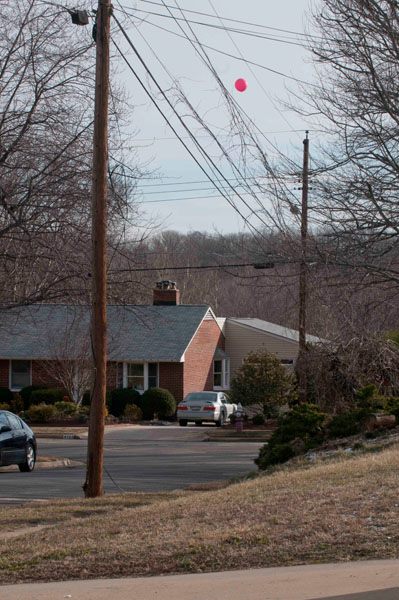Mason land use committee reviews Parklawn cell tower proposal
 |
| A “balloon test” shows the height of the tower. |
The large meeting room at the Mason District Government
Center was packed Feb. 26, as supporters and opponents of a proposed cell tower
at the Parklawn Pool made their case before the Mason District Land Use Committee (MDLUC).
construct a 128-foot “monopine,” a cell tower disguised as a redwood tree, and utility shed in a
wooded area on property owned by the Parklawn Recreation Association (PRA).
and will address the issue again at its March 26 meeting. The Fairfax County Planning Commission is scheduled to have a public hearing on the cell tower
April 25. It will go before the Board of Zoning Appeals May 8.
tower is needed because there have been lots of complaints about the lack of
coverage in the area. Since he spoke at a community meeting in November, some
changes have been made in the proposal: No trees will be removed, and a fence
has been added.
AT&T was unable to point out on a map the areas in the community that lack
cell coverage and failed provide information on alternative sites.
PRA President Heath Brown said he supports the tower because
residents of the community don’t have good cell reception and because the tower
will help the pool. The pool is a valuable asset to the community, providing a
place for exercise and social activities, Brown said, but the PRA is in a “precarious
financial situation” with waning membership, aging facilities, and no money to
invest in large capital projects. The pool is in a “death spiral,” and its
future survival depends on the revenue it would get from the cell tower, he
said.
oppose the cell tower, said there are many other alternative sites nearby, such
as Peace Lutheran Church, Dora Kelley Park, and Glen Hills Park, that would
provide good coverage and where the cell tower would have less of a visible impact. If it goes up at
the pool, he said, it would “stick out garishly like a sore thumb.”
of coverage. He said his wife sees vagrants, sometimes naked, while jogging
through the neighborhood and would be unable to call the police if threatened.
asked Mary Lynch, who lives on Teton Place and does have good cell reception.
The tower will be very visible from her house and “would certainly devalue my
quality of life,” she said. John Edwards, who also lives on Teton Place, which
is adjacent to the pool property, urged AT&T to consider newer, less
invasive technology.
tower proposal has split the community with some neighbors no longer talking to
one another. She raised concerns about the visibility of the tower and its
impact on health, wildlife, and the watershed and suggested the PRA consider
other ways to raise money.
and found the land has a restrictive covenant stating it can’t be used for for-profit
purposes, so the cell tower would be in violation of the deed. Also, the PRA
charter says the PRA must benefit the residents of Parklawn. “The deed restriction is a contractual issue, not a land use
issue,” Donohue responded. “That’s a matter for the courts if she wants to
litigate.”
reminded the audience that if the pool fails financially, the land could be
sold to a private developer who would put up condos. Janet Hall, who represents Mason on the Planning Commission,
noted the land is zoned R-3, so a higher-density development would require a
lengthy rezoning process. [Considering how much infill development is going on
around here, though, something like that isn’t out of the question.]
only consider land use and cell coverage—not issues about pool revenue or
health. “Those may be valid concerns of yours but they’re not something we can
address.” She also said resale data show cell towers don’t lead to declines in
property values.
at Saint Michael School on Ravensworth Road in Annandale. The school wants to renovate two
existing classrooms for 3 and 4-year-olds. The facility wouldn’t be expanded
and the school’s enrollment wouldn’t increase, said Lynne Strobel a land use attorney representing Saint Michael..
Ravensworth, but Strobel told the MDLUC that
shouldn’t be necessary. The Planning Commission is scheduled to hear the
preschool proposal April 4.
retiring from the committee after 25 years. He was recognized Feb. 26 by the
Board of Supervisors. MDLUC member Dan Aminoff will be the new chair.


Thank you for continuing to cover the Parklawn Cell Tower issue. Your information to those affected on both sides of this issue remains invaluable.
Thanks for covering the Land Use Committee meeting and keeping the residents aware of events that affect them.
Has the Parklawn Civic Association President issued a position on the Parklawn cell tower?? (Or did I miss it?) Did she attend the meeting and make a statement either in favor or in opposition to the proposal?
No, the Parklawn Civic Association has not taken a position on the cell tower because the residents are divided on it.
The Parklawn Civic Association (PCA) has not taken an official position on the cell tower proposal. I explained to the land use commission that PCA conducted a survey of opinion which resulted in mathematical output data (pro and con) for Parklawn and the surrounding neighborhoods. PCA forwarded this survey to Aaron Frank of Penny Gross's office.
Richard C. Zambito
Vice President
Parklawn Civic Association